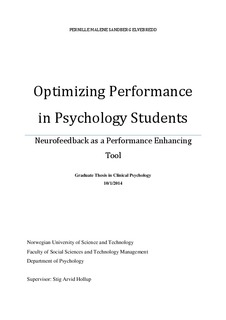Optimizing Performance in Psychology Students - Neurofeedback as a performance enhancing tool
Master thesis
Permanent lenke
http://hdl.handle.net/11250/282581Utgivelsesdato
2014Metadata
Vis full innførselSamlinger
- Institutt for psykologi [3143]
Sammendrag
Neurofeedback has been shown to be successful in treating epilepsy and ADHD and in enhancing performance in musicians and dancers. The objective of the current study was to examine the effect of a neurofeedback beta1/theta protocol as a tool for optimizing performance in healthy psychology students. To achieve this, 19-channel EEG was recorded during a visual Go/NoGo task at two time points, both prior to and following either ten sessions of neurofeedback training (10 individuals) or ten sessions of computerized working memory training (5 individuals), with the hypothesis that neurofeedback but not computerized working memory training would lead to statistically significant gains in sustained attention. The pre- and posttest results of the two groups were compared on measures of reaction time, reaction time variability, errors, and P300 latency and amplitude for both Go and NoGo conditions. The results showed no statistically significant differences between the experiment group and the control group at either time points. The experiment group showed statistically significant (p<0.005) changes in reaction time at posttest, also displaying a high practical significance (Cohen’s d = 1.16). Results showing that only the experiment group displayed statistically significant improvements on variables of sustained attention suggest that neurofeedback has merits in the field of peak performance, with practical implications for everyday life.
